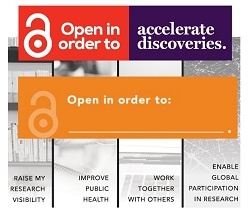Open Access Week 2017 : initiatives and resources pushing in support of Open Science


See: SPARC site highlighting examples of concrete benefits of making research open
Happy International OPEN ACCESS Week , #OAweek , #OAWeek17 !
To celebrate the 10th edition of this global community-driven event, a number of communities of practice world-wide are pushing their #OpenAccess- themed events, new projects, webinars, posts . . . and many other initiatives and resources, - to support and advocate for "OPEN in ORDER to…" – that is this #OAweek year's topic. Open Access is the main driving force behind Open Science.
OPEN ACCESS - THE FREE, IMMEDIATE, ONLINE ACCESS TO ... |
... the results of scholarly research, and the right to use and re-use those results as you need - - is transforming the way research and scientific inquiry are conducted. Providing Open Access to research has the power to accelerate scientific advancements and spur job growth in a wide range of fields, from healthcare to energy to agriculture”, - SPARC.
"Costs associated with open access to research data, including the creation of the data management plan, can be claimed as eligible costs of any Horizon 2020 grant", - EC-Participant Portal H2020 Online Manual (Open Access & Data Management.
SCIENCE MUST BE OPENED, BECAUSE SCIENCE OPENS EVERYTHING ELSE ... |
@ "My open access action is... to promote access to knowledge” ...
@ “Anyone, anywhere in the world should have free, unhindered access to not just my research, but to the research of every great and inquiring mind across the spectrum of human understanding"
@ “Fair Open Access - returning control of scholarly journals to their communities”
@ "Concrete and potential benefits to be achieved by making scholarly outputs openly available?"
@ “Dropping a paywall for a week is not #openaccess”
@ "How to make scholarly outputs openly available, or rather FAIR : findable, accessible, interoperable, and reusable ?"... -
- these and hundreds of other quotes are marking this #OAweek on social networks, while communicating "WHY OPEN RESEARCH" and "HOW OPEN SCIENCE HELPS RESEARCHERS" to:
|
|
|
According to G7 SCIENCE MINISTERS’ COMMUNIQUÉ, the speed and coherence of this transition should target in particular two aspects : |
1.) First, the incentives for the openness of the research ecosystem: the evaluation of research careers should better recognize and reward Open Science activities. 2.) Secondly, the infrastructures for an optimal use of research data: all researchers should be able to deposit, access and analyze scientific data across disciplines and at the global scale, and research data should adhere to the FAIR principles of being findable, accessible, interoperable, and reusable. |
DISCOVER, LEARN ABOUT, GET INSPIRED, REPLICATE, RE-USE AND SHARE ... |
... countless Open Access activities and resources shared across the globe that can be found here. For the full breadth of discussion check out #OAweek, #OpenScience, #OpenPeerReview, #OpenData.
Below you will find some highlighted initiatives pushing the boundaries of Open Access tools, publishing and advocacy :
|
|
|
|
|
|
|
|

"Providing researchers with the skills and competencies they need to practise Open Science" (Open Science Skills Working Group Report, EC 2017).
Source: Open science in Natural Sciences: Workflows and Tools (OpenAIRE webinar, slides)
P.S. Starve Your Distractions … Feed Your #OpenAccess Focus ! = trasparency - efficiency - sustanaibility - regour - re-usability, - the right thing to do ! |

